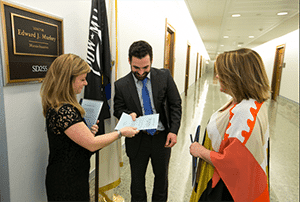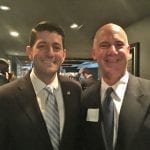
SAF members’ push for access to labor via immigration reform will continue during SAF’s 2017 Congressional Action Days.
The election of Donald Trump and Republican majorities in the House and Senate signals change in Washington. That much is certain. What’s unclear is exactly how this new administration will act and how those actions could affect floral industry business owners, said Shawn McBurney, SAF’s senior director of government relations.
“Having unified party control in Washington could mean more congressional action, but again, it’s too soon to tell,” said McBurney, who recently shared some of his thoughts on how the new administration could change the landscape for small businesses.
“As demonstrated by the nearly complete failure of pundits, polls and political experts to accurately predict the outcome of the presidential election, my comments should be read knowing that much can and will change over the next few months as the administration’s priorities take shape,” he said. “This is simply my effort to provide a peek at what may be ahead.”
Immigration
“Immigration was a central part of Donald Trump’s campaign as he called for deportations of illegal immigrants, proposed requiring Mexico to pay for a border wall, and called for mandating all employers use E-Verify to check the legal status of new hires,” McBurney said. “In actual policy terms, his stance was to take a hard line on enforcement of the current immigration system.”
Many of President–elect Trump’s ideas on immigration cannot be implemented without Congressional approval, he noted.
“Finding consensus will not be easy even in a Republican-controlled Congress,” McBurney said.
Focusing on the industry’s continuing challenge to find and keep workers, SAF has supported legislation creating a path to some kind of legalization for undocumented workers. Trump has not expressed support for that approach. If not done properly, efforts to curb illegal immigration could worsen an already difficult situation in the industry, especially for growers
SAF will continue to push in 2017 for immigration reform that helps growers access the labor they need, said McBurney. “But we’re also open to pragmatic solutions proposed by a Trump administration and other groups working on this difficult issue.”
Health Care
Trump has promised to repeal and replace the Affordable Care Act (ACA).
“Look for him to work with congressional republicans to carry out that promise, although Congress will have a say in how to dismantle and reinvent a program that has become embedded in the nation’s health care system,” McBurney said.
Trump has called for individual deductions for health care expenses, tax-free treatment of health savings accounts (HSAs), modifying laws so that health insurance can be sold across state lines and other changes. SAF supported some of these suggestions during the debate leading up to passage of the Affordable Care Act, McBurney said, and will “watch this discussion closely.”
Taxes
Trump has vowed to act on tax reform in the first 100 days of his administration. He has said he would lower the top income tax rate to 33 percent from 39.6 percent, reduce the corporate tax rate to 15 percent from 35 percent, eliminate federal estate and gift taxes and significantly reduce the standard individual deduction. The increased standard deduction would remove millions of taxpayers from federal income tax rolls. His proposals also include the repeal of most tax deductions for businesses.
Some estimates show that these tax reductions would reduce federal refenues by $6.2 trillion over the next decade.
“Enacting these changes would require congressional approval, but in general these proposals are in line with previous ideas endorsed by congressional Republicans,” McBurney said.
Regulations
“Donald Trump campaigned on the promise of getting rid of many regulations due to their perceived overreach, and it’s likely we’ll see that happen in his administration,” McBurney said.
The Environmental Protection Agency (EPA) will be a prime target for regulatory reform by the incoming administration, especially its contentious Waters of the U.S. (WOTUS) regulation which was a significant campaign issue for Trump in rural America and one about which SAF has commented.
“Look for possible action on the EPA’s pesticide registration process,” McBurney said.
On climate change, Trump is highly skeptical of the existing scientific evidence and has said that climate change is a Chinese creation designed to make U.S. manufacturing non-competitive. He has vowed to undo President Obama’s domestic and international climate change policies. President-elect Trump has also talked about undoing existing banking regulations.
Labor Policy
Donald Trump’s positions on specific aspects of labor policy have been vague, but he could reverse interpretations of laws made by the Obama administration that protect workers’ rights.
“The new overtime regulations could be undone by a Trump administration or Congress could enact some adjustments in the regulation to phase it in or undo certain elements such as the automatic adjustment in salary thresholds that trigger overtime,” McBurney said. “The Trump administration could also reverse rulings relating to easing the ability of unions to bring workers into their organizations.”
Agriculture
In late summer, Trump’s campaign named nearly 70 individuals to guide his administration on agricultural policy, including Senator Pat Roberts (R-Kan.), Reps. Mike Conaway (R-Texas), Rodney Davis (R-Ill.), Robert Aderholt (R-Alabama), and Bob Goodlatte (R-Virginia), and five state Governors: Terry Branstad (Iowa), Sam Brownback (Kansas), Mary Fallin (Oklahoma), Jack Dalrymple (North Dakota), and Dennis Daugaard (South Dakota). It is likely that President-elect Trump’s Secretary of Agriculture will come from this group of agricultural policy advisors.
“The Trump administration will be involved in 2018 Farm Bill negotiations which will be important to the floral industry,” McBurney said, “and there will likely be some new players on the House Agriculture Appropriations Subcommittee that SAF will need to engage as we look to increase funding for the Floriculture and Nursery Research Initiative.”
Infrastructure
Trump and Hillary Clinton agreed that more money should be spent on stabilizing and improving the country’s infrastructure, although Trump suggested spending more — up to $1 trillion — than Clinton. Look for proposals to rebuild our infrastructure early in the next administration.








